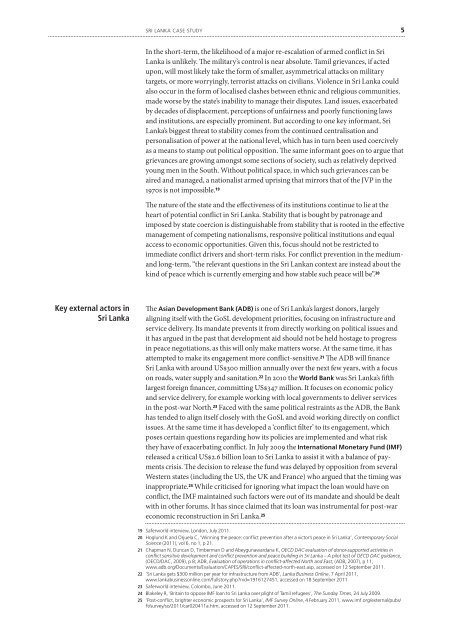FAB Sri Lanka
FAB Sri Lanka
FAB Sri Lanka
You also want an ePaper? Increase the reach of your titles
YUMPU automatically turns print PDFs into web optimized ePapers that Google loves.
Key external actors in<br />
<strong>Sri</strong> <strong>Lanka</strong><br />
s r i l a n k a c a s e s t u d y 5<br />
In the short-term, the likelihood of a major re-escalation of armed conflict in <strong>Sri</strong><br />
<strong>Lanka</strong> is unlikely. The military’s control is near absolute. Tamil grievances, if acted<br />
upon, will most likely take the form of smaller, asymmetrical attacks on military<br />
targets, or more worryingly, terrorist attacks on civilians. Violence in <strong>Sri</strong> <strong>Lanka</strong> could<br />
also occur in the form of localised clashes between ethnic and religious communities,<br />
made worse by the state’s inability to manage their disputes. Land issues, exacerbated<br />
by decades of displacement, perceptions of unfairness and poorly functioning laws<br />
and institutions, are especially prominent. But according to one key informant, <strong>Sri</strong><br />
<strong>Lanka</strong>’s biggest threat to stability comes from the continued centralisation and<br />
personalisation of power at the national level, which has in turn been used coercively<br />
as a means to stamp out political opposition. The same informant goes on to argue that<br />
grievances are growing amongst some sections of society, such as relatively deprived<br />
young men in the South. Without political space, in which such grievances can be<br />
aired and managed, a nationalist armed uprising that mirrors that of the JVP in the<br />
1970s is not impossible. 19<br />
The nature of the state and the effectiveness of its institutions continue to lie at the<br />
heart of potential conflict in <strong>Sri</strong> <strong>Lanka</strong>. Stability that is bought by patronage and<br />
imposed by state coercion is distinguishable from stability that is rooted in the effective<br />
management of competing nationalisms, responsive political institutions and equal<br />
access to economic opportunities. Given this, focus should not be restricted to<br />
immediate conflict drivers and short-term risks. For conflict prevention in the medium-<br />
and long-term, “the relevant questions in the <strong>Sri</strong> <strong>Lanka</strong>n context are instead about the<br />
kind of peace which is currently emerging and how stable such peace will be”. 20<br />
The Asian Development Bank (ADB) is one of <strong>Sri</strong> <strong>Lanka</strong>’s largest donors, largely<br />
aligning itself with the GoSL development priorities, focusing on infrastructure and<br />
service delivery. Its mandate prevents it from directly working on political issues and<br />
it has argued in the past that development aid should not be held hostage to progress<br />
in peace negotiations, as this will only make matters worse. At the same time, it has<br />
attempted to make its engagement more conflict-sensitive. 21 The ADB will finance<br />
<strong>Sri</strong> <strong>Lanka</strong> with around US$300 million annually over the next few years, with a focus<br />
on roads, water supply and sanitation. 22 In 2010 the World Bank was <strong>Sri</strong> <strong>Lanka</strong>’s fifth<br />
largest foreign financer, committing US$347 million. It focuses on economic policy<br />
and service delivery, for example working with local governments to deliver services<br />
in the post-war North. 23 Faced with the same political restraints as the ADB, the Bank<br />
has tended to align itself closely with the GoSL and avoid working directly on conflict<br />
issues. At the same time it has developed a ‘conflict filter’ to its engagement, which<br />
poses certain questions regarding how its policies are implemented and what risk<br />
they have of exacerbating conflict. In July 2009 the International Monetary Fund (IMF)<br />
released a critical US$2.6 billion loan to <strong>Sri</strong> <strong>Lanka</strong> to assist it with a balance of payments<br />
crisis. The decision to release the fund was delayed by opposition from several<br />
Western states (including the US, the UK and France) who argued that the timing was<br />
inappropriate. 24 While criticised for ignoring what impact the loan would have on<br />
conflict, the IMF maintained such factors were out of its mandate and should be dealt<br />
with in other forums. It has since claimed that its loan was instrumental for post-war<br />
economic reconstruction in <strong>Sri</strong> <strong>Lanka</strong>. 25<br />
19 Saferworld interview, London, July 2011.<br />
20 Hoglund K and Orjuela C, ‘Winning the peace: conflict prevention after a victor’s peace in <strong>Sri</strong> <strong>Lanka</strong>’, Contemporary Social<br />
Science (2011), vol 6, no 1, p 21.<br />
21 Chapman N, Duncan D, Timberman D and Abeygunawardana K, OECD DAC evaluation of donor-supported activities in<br />
conflict sensitive development and conflict prevention and peace building in <strong>Sri</strong> <strong>Lanka</strong> – A pilot test of OECD DAC guidance,<br />
(OECD/DAC, 2009), p 8; ADB, Evaluation of operations in conflict-affected North and East, (ADB, 2007), p 11,<br />
www.adb.org/Documents/Evaluation/CAPES/SRI/conflict-affected-north-east.asp, accessed on 12 September 2011.<br />
22 ‘<strong>Sri</strong> <strong>Lanka</strong> gets $300 million per year for infrastructure from ADB’, <strong>Lanka</strong> Business Online, 7 April 2011,<br />
www.lankabusinessonline.com/fullstory.php?nid=1916127451, accessed on 18 September 2011<br />
23 Saferworld interview, Colombo, June 2011.<br />
24 Blakeley R, ‘Britain to oppose IMF loan to <strong>Sri</strong> <strong>Lanka</strong> over plight of Tamil refugees’, The Sunday Times, 24 July 2009.<br />
25 ‘Post-conflict, brighter economic prospects for <strong>Sri</strong> <strong>Lanka</strong>’, IMF Survey Online, 4 February 2011, www.imf.org/external/pubs/<br />
ft/survey/so/2011/car020411a.htm, accessed on 12 September 2011.


